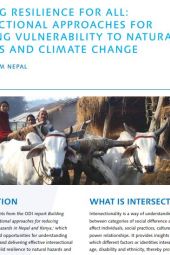Building Resilience for All: Intersectional Approaches for Reducing Vulnerability to Natural Hazards and Climate Change Findings from Nepal
Summary
The research in Nepal focused on the experiences of women and men in different ethnic and caste groups. This includes women and men from disadvantaged groups (the ethnicity/caste groups that belong to the categories of Dalits, disadvantaged Janajatis, and disadvantaged Madhesis) and women and men from other groups (all caste/ethnic groups that do not fall under the category of disadvantaged groups). The fieldwork took place in Bardiya district.
This note discusses insights from the ODI report "Building Resilience for All: Intersectional Approaches for Reducing Vulnerability to Natural Hazards in Nepal and Kenya." Focusing on the Nepal study, the report emphasizes the significance of understanding intersecting inequalities in the context of natural hazards, climate change, and climate variability. People's experiences of these phenomena are shaped by their social, economic, cultural, political, and environmental contexts. Marginalized and disadvantaged groups, often residing in areas more exposed to environmental shocks, are particularly vulnerable. The note underscores the need to comprehend how various factors intersect to create exclusion, inequalities, and vulnerabilities in multi-hazard contexts. This understanding is crucial for developing policies and programs that build resilience tailored to local contexts and effectively support those most in need.
Categories:
Case Studies
Publisher:
Braced Knowledge Manager
Published Year:
2019
